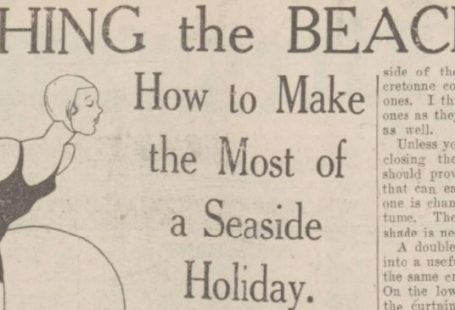This week at The Archive has been another busy one, as we have added a grand total of 140,146 brand new pages to our collection. Furthermore, we are delighted to welcome five brand new titles to The Archive this week – all with a Scottish flavour!
So read on to discover more about the new titles we have added this week, from Glasgow, Inverness and Kirriemuir respectively, and to find out which of our ten titles we have added new pages to. Meanwhile, we remember a tragic incident on the Clyde some 138 years ago, which claimed the lives of 124 men and boys.
Register now and explore the Archive
First of our five new Scottish titles this week is the Glasgow Weekly Herald. Published every Saturday and priced at 3 halfpennies, the Glasgow Weekly Herald was filled with poetry and anecdotes, and the latest news from Scotland and beyond. It covered the district news from Glasgow itself, as well as other towns like Ayr, Paisley, Greenock, Hamilton, Dumbarton and Falkirk, containing tidings of the latest ‘Scotch Bankrupts.’
Glasgow Weekly Herald | 3 October 1891
In January 1885 the Glasgow Weekly Herald was enlarged to become ‘the largest penny weekly paper in the kingdom,’ its price having also been reduced. With a keen emphasis on all things literary, the Weekly Herald was famous for the story competitions it ran – called ‘prize tales.’ In 1880 the winning story was entitled the ‘Alderside Mystery,’ which adjudicators characterised as ‘A Scotch story with several strong-drawn Scottish characters.’
Another weekly Glasgow paper with a literary bent was the Glasgow Weekly Mail, which we are delighted to welcome to The Archive this week. First published on 1 March 1862, and appearing every Saturday priced at 1 1/2d, its first edition promised to:
…devote special attention to questions with the Sanitary and Social Improvement of the People and will watch carefully all the local Proceedings…It will contain FULL Reports of the state and prospects of the various Markets, prices of Stock, and all such other information as may be required by a great Manufacturing and Commercial community.
Furthermore, the Glasgow Weekly Mail promised that:
Care will be taken to make the Glasgow Weekly Mail in every way fitted for family perusal. A portion of its space will be exclusively devoted to INSTRUCTIVE and AGREEABLE reading… Literature, Science and Art will be carefully attended to; and neither expense nor trouble will be spared to make the Glasgow Weekly Mail the most complete and desirable Family Newspaper published in the country.
Indeed, the Glasgow Weekly Mail established a reputation as both a ‘Cheap Weekly Newspaper’ and a ‘First Class Family Newspaper,’ all the while advocating ‘sound Liberal measures for the Reformation of the Laws and the Improvement of the People.’
Glasgow Weekly Mail | 10 July 1880
In 1894, the newspaper published 22 short stories and one novel by Arthur Conan Doyle – all featuring Sherlock Holmes – demonstrating its strong literary persuasion. It featured other stories like James Smith’s Wee Curly, which was full of ‘Scottish life and character.’
Meanwhile in 1904 disaster struck when the offices of the Glasgow Weekly Mail were hit by fire. However, publication of the newspaper did not stop, as other Glasgow newspapers rallied around to help support their rival.
Moving on to our next new title of the week – the Kirriemuir Free Press and Angus Advertiser. Published in Kirriemuir, a burgh in Angus, and established in 1884, the Kirriemuir Free Press and Angus Advertiser was a free and independent newspaper which circulated in West Angus.
Kirriemuir had ‘long been distinguished as a seat of gratis newspapers.’ The Forfar Herald wrote in 1908 how the Kirriemuir Free Press and its rival the Kirriemuir Observer and General Advertiser (soon also to be appearing on The Archive) had ‘proved a boon to the community generally, and to the friends abroad who heartily welcome the weekly messages of Throoms.’
Kirriemuir Free Press and District Advertiser | 14 June 1918
Full of advertisements, the Kirriemuir Free Press also contained public notices, for example promoting a ‘grand football match’ soon to take place between Rosevale and Queen’s Park, as well as featuring local and district news.
We move to Inverness now for our next new titles. First up from the capital of the Scottish Highlands is the Inverness Advertiser and Ross-shire Chronicle. First published in 1849, it catered to the county of Ross-shire, as well as ‘Elgin, Nairn, Cromarty, Sutherland, Caithness and the Isles.’
Appearing every Tuesday, priced at 4d and consisting of eight pages, it was published by James McCosh. The Evangelical James McCosh had come from Dundee, where he conducted the Northern Warder. His new venture, the Inverness Advertiser, was soon a big success, but McCosh barely lived to see it, passing away a couple of months after his newspaper was first published.
Inverness Advertiser and Ross-shire Chronicle | 20 June 1884
The Inverness Advertiser was soon sold by McCosh’s family, passing through various hands. From 3 February 1860 onwards it became tri-weekly, until it was purchased in 1885 by rival newspaper the Inverness Courier. We have the full run of the Inverness Advertiser and Ross-shire Chronicle available to search on The Archive.
Rounding off our new titles of the week is the Inverness Journal and Northern Advertiser. ‘Decked in Tory colours,’ the Inverness Journal was somewhat of a controversial title. Indeed, the John o’Groat Journal in July 1839 wrote how:
The public are threatened with the reappearance of the Inverness Journal, a Tory paper which committed suicide about two or three years ago. A general opinion prevailed, and every sensible, quiet-living person hoped, that the print had been consigned to ‘the grave of all Capulets,’ when, lo!, out comes its Prospectus.
The Inverness Journal was founded in the early nineteenth century, published on a Friday with a wide remit of national and international news, featuring sections on ‘Foreign Intelligence’ from Spain and France, and ‘Domestic Intelligence’ from London and the House of Lords. In the 22 May 1812 edition it contains a detailed description of the assassination of then Prime Minister Spencer Perceval, even including a diagram of where the murder took place.
Inverness Journal and Northern Advertiser | 8 January 1830
By the 1830s, however, the Inverness Journal adopted a more localised focus, with the latest from Inverness, including news of local elections and the latest from the Inverness magistrates. Meanwhile, in 1839 the Inverness Journal laid out its new principles:
It is needless, we hope, to state that they will be unequivocally independent – entirely free from the trammels imposed by servile attachment to party…Its efforts…will be directed to the steadfast maintenance of the great principles of constitution in church and state – to the advocacy of real and substantial reform, as contradistinguished from revolutionary demolition and anarchy, and to upholding the churches of empire, more especially the Church of Scotland, of which the Journal has ever been a warm supporter.
It was clear then that the Inverness Journal was maintaining its Conservative ties. And its rival papers were sceptical, the John o’Groat Journal noting how:
In re-establishing the Inverness Journal, the two principle objects in view appear to us to be – the getting rid of a superabundance of bile, and a superfluity of cash.
Meanwhile at The Archive, we have been busy updating some of our existing titles. Highlights this week include the over 14,000 pages we have added to the Blackpool Gazette and Herald, whilst we have added over 10,000 pages to Stockton-on-Tees title the Northern Weekly Gazette. As ever, you can find full details of all our new and updated titles at the end of this blog.
Disaster on the Clyde – The Sinking of the SS Daphne
On the 3 July 1883 disaster struck in one Glasgow’s shipbuilding districts, Govan, on the Clyde. Our new title, the Glasgow Weekly Herald, contains the following account:
The river Clyde was on Tuesday the scene of a terrible disaster, involving a lamentable loss of life. A small vessel, the Daphne of about 500 tons, was being launched from the yard of Messrs Stephen & Sons, Govan, when, just as she entered the water, she heeled over and sank almost instantaneously.
Capsizing of the Daphne | Graphic | 14 July 1883
What made the disaster all the more terrible were the amount of people onboard the Daphne as she went into the water:
On board the Daphne was a large number of workmen – joiners, fitters, riveters, labourers, and others – and these were carried down with the sinking vessel. Everything possible was done to save life by those on shore, small boats being manned and ropes and loose timbers thrown into the river. By these means a considerable number of the men struggling in the water were rescued.
Many of the workmen, however, were in the interior part of the vessel, and so sudden was the accident that they did not succeed in reaching the deck. Altogether, it is now certain that over 100 men perished.
The Glasgow Weekly Herald comments on the ‘appalling disaster,’ and how ‘the catastrophe was sudden as it was unexpected.’ Indeed, the tragedy had occurred during a fairly run of the mill operation on the Clyde – there was nothing remarkable about the Daphne, and launches such as this one were commonplace and usually conducted without incident.
Dundee Advertiser | 13 July 1883
The Daphne, 175 feet long with a 13 1/2 feet deep hold, was destined for the Irish Channel Fleet of Messrs. A. A. Laird & Co., and it was hoped that she would be completed by the Fair Holidays, which were taking place that weekend. The Glasgow Weekly Herald notes how it was:
On account of this urgency… the number of workman employed on board was much larger than is customary while a vessel is being launched.
The newspaper goes on to give this detailed account of the moment that disaster struck the Daphne:
High water was at half-past eleven o’clock, and at twenty-five minutes past eleven the naming ceremony was performed, the dogshores were knocked away amid the ringing cheers of the assembled multitude. But scarcely had she taken the water when the cheering and congratulation gave place to horror and dismay. To some present it seemed that the rapidity with which the vessel left the way was somewhat excessive, and when she entered the water she went very deep by the stern. Then, without a moment’s warning, she took a heavy lurch to port, quivered for what appeared but a moment or two, as if in an effort to right herself, then toppled over on her beam ends, and disappeared beneath the dark and rapidly flowing tide, carrying with her to an untimely end a fearful number of hapless victims.
The hull of the Daphne at low tide | Illustrated London News | 14 July 1883
Painter John Russell, aged 28, survived the sinking, and gave the following account to the Glasgow Weekly Herald:
I had been working in the ship for about three weeks. I was standing about midships on the port side when the ship left the ways. She went down all right, but immediately on getting clear of the ways she went right over, just as if she was top heavy, and had too little ballast. There were a lot of men standing about me at the time. When she went down, I caught hold of the rail on the port side, and when I saw that she was going to heel right over, I turned and went up the deck to the starboard side. I got over the rail and jumped into the water. I am a good swimmer, and I made for the Govan side of the river.
Meanwhile, a second disaster threatened to strike when crowds gathered to witness the aftermath of the tragedy:
The crowds had now increased to thousands, all the workpeople who had been set free at the close of the day’s labour in the neighbouring yards and workshops flocking to the place. The wooden gangway which passes along the front of the yard as a continuation of the footpath along the south bank of the river was taken possession by onlookers, and it was feared that it might give way and precipitate all into the water.
The crowds were thankfully dispersed by police, as rescue efforts went on. Divers were quickly sent down to the sunk ship, but as night came on conditions worsened, and it took upwards of a fortnight to recover all those who had lost their lives on the Daphne.
A diver prepares to search the Daphne | Illustrated London News | 14 July 1883
The loss of the Daphne tore a hole in the heart of the working-class families of Glasgow, the Glasgow Weekly Herald commenting how the the ‘dreadful calamity has brought mourning to many a fireside in our midst, and has eclipsed the gaiety of the whole community.’ This is reflected in the outpouring of grief in the local newspapers of the time. The Glasgow Weekly Herald on the 14 July 1883 published a poem entitled ‘Rivet Jim – An Incident of the Clyde Disaster’ by James Nicholson, its first verse running as follows:
Of all the sad calamities
That fell upon our town,
Filling our hearts with dread that day
The Daphne went down,
Poor little Jim, the rivet boy,
His fate I most bewail,
And scarce can yet restrain the tear
While I unfold the tale.
Meanwhile the Glasgow Weekly Mail, 14 July 1883, contained a ‘Completed List of the Bodies Recovered,’ which featured the names, ages, addresses and family situations of the victims of the sinking. The youngest victims of the disaster contained here are John Laden, 14, who was a rivet boy from 8 Muirhead Street, Partick and James Douglas Stephen, also 14, an apprentice plumber from Partick, the second eldest of eight siblings.
Glasgow Weekly Mail | 14 July 1883
The eldest of the victims was Duncan Morrison, 66, a rigger from Govan. He left behind a widow and ‘three of family.’ These short descriptions contain an overwhelming amount of sorrow, somebody’s husband, son, father, brother, and ultimately breadwinner, had been lost to the waters of the Clyde.
A month after the tragedy, on 4 August 1883, the Glasgow Weekly Mail published a piece by their ‘Special Correspondent’ entitled ‘At Home with the Bereaved.’ Here is the testimony of one of the victim’s mothers:
My son [a rivet boy] drowned at the launch had been my only support since I fell into bad health. He was seventeen years of age, and a good son to me…I have buried my husband and nine sons…I was looking forward to my boy who was with me to be the comfort of my old age. He was aye thinking of making me comfortable. He was happy on the last night he was with me at home…singing ‘The Darling Fisher Boy,’ and joking me that I would grieve for my darling boy if he was lost…But I will soon follow him I hope…
Recovering the victims | Graphic | 14 July 1883
Victims’ families were aided by the Daphne Relief Fund, and other private donations, but nothing can make up for the loses that they endured. And we take a moment here to remember the 124 men and boys who died that July day on the Clyde, during what should have been just another day at work.
New Titles
Title |
Years Added |
| Glasgow Weekly Herald | 1865, 1867-1869, 1879-1881, 1883-1885, 1887, 1889, 1891-1892 |
| Glasgow Weekly Mail | 1862-1864, 1866-1868, 1879-1880, 1883, 1886, 1888, 1890-1892 |
| Inverness Advertiser and Ross-shire Chronicle | 1849-1885 |
| Inverness Journal and Northern Advertiser | 1812-1833, 1835-1836, 1840-1842, 1844-1848 |
| Kirriemuir Free Press and Angus Advertiser | 1928-1949 |
Updated Titles
This week we have updated ten of our existing titles.
You can learn more about each of the titles we add to every week by clicking on their names. On each paper’s title page, you can read a FREE sample issue, learn more about our current holdings, and our plans for digitisation.
Title |
Years Added |
| Blackpool Gazette & Herald | 1895-1896, 1899-1907, 1913-1919 |
| East Riding Telegraph | 1898 |
| Halifax Comet | 1903 |
| Herald of Wales | 1882 |
| Northern Weekly Gazette | 1910, 1922-1923, 1925-1928, 1930-1931 |
| Ripon Observer | 1889, 1917-1918 |
| St. Helens Examiner | 1889 |
| Stockton Herald, South Durham and Cleveland Advertiser | 1893-1894 |
| Weekly True Sun | 1835, 1839 |
| Weymouth Telegram | 1883, 1885-1886 |
You can keep up to date with all the latest additions by visiting the recently added page. You can even look ahead to see what we’re going to add tomorrow.

















